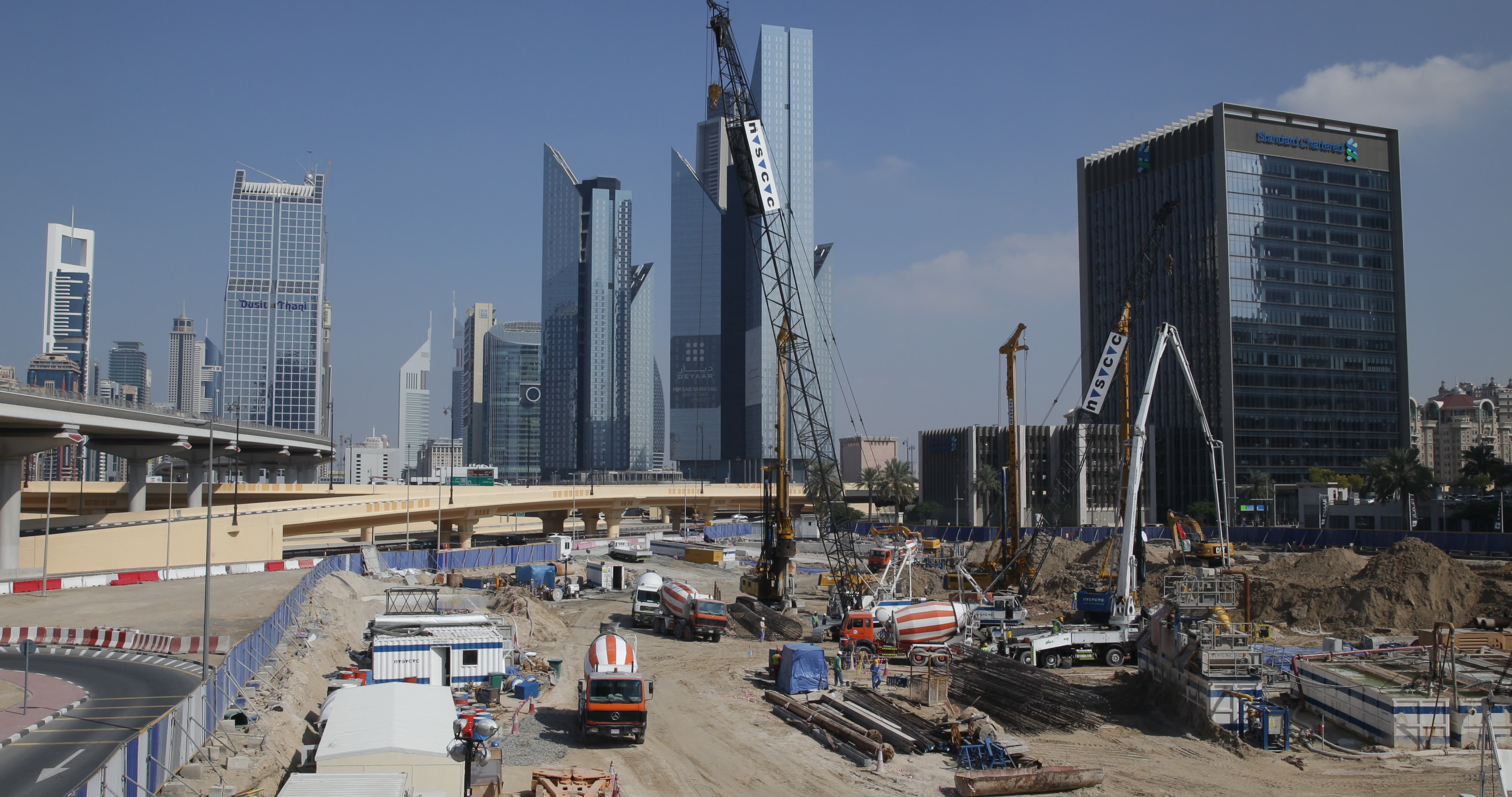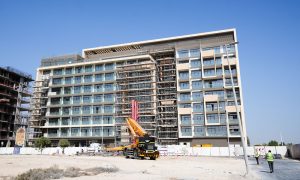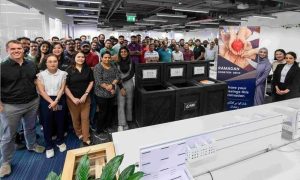Education – A Matter of Priority
Big Project ME finds out if a lack of construction education opportunities could be the missing link in fulfilling the GCC’s growing unemployment demand

The development of the GCC states is well underway, with heavy financial investment from the government into a number of billion dollar infrastructure projects. Saudi Arabia is the biggest market for the construction industry thanks to projects such as the Riyadh Metro and the Haramain Railway.
The UAE is not far behind, with projects that are required to fulfil its aims to host the Expo 2020 and to support Vision 2030 in Abu Dhabi. Qatar, as is well known, is spending massively to get ready for the World Cup in 2022 and for its own Vision 2030.
Given the scale of these construction projects and what they mean to the future of the GCC, it’s quite surprising to find that there isn’t actually a strong support system in place that will feed into their development.
Of course, there are huge contracting and consulting firms bidding for the right to build these projects. It’s certain that they’ll do an excellent job in bringing them in on schedule and hopefully, on budget. But the bulk of these projects will require expertise to be brought in from overseas. It’s no secret that the professional staff in the construction industry in the GCC is dominated by expatriate workers providing the engineering and technical know-how to get things done.
While it is unrealistic to expect that the demand from the construction industry will be fully met from the region, it isn’t unreasonable to suggest that there is a large pool of talent that is being under utilised.
According to World Bank projections, the GCC labour force will exceed 20.5 million by 2020 – which is an increase of almost 30% from the current estimated labour force of 15.6 million. Back in 2008, national unemployment in Saudi Arabia and the UAE was estimated to be 13% and 14% respectively, a report released by Booz & Co says.
In Bahrain and Oman, despite the rapid economic growth since 2003, national unemployment stood at 15%. Qatar meanwhile, fared much better, with just 3.2% unemployment in 2007. However, the vast majority of nationals employed work in the government sector.
The Booz & Co report pinpointed the main reason for this high unemployment rate.
“Education failings are the cause of a lot of the GCC’s employment problems. Vocational training, science curricula and alignment with industry needs all need to be improved,” it says.
This was starkly obvious during the researching of this feature. Focusing solely on identifying what was needed to service the needs of the regional construction industry, Big Project ME found that there was a surprising lack of educational institutions that focus on equipping graduates with the skills they need to survive in an extremely competitive and challenging environment.
“It’s interesting that the educational issues in relation to construction in the Gulf in general is different to the UK and the Commonwealth approach. In most universities in the UK, Malaysia and Singapore – places that are part of the Commonwealth – it’s typical to see a department of construction management or a built environment school. You hardly see them in the Gulf,” says Professor Ghassan Aouad, president of the Chartered Institute of Building (CIOB) and vice-president for Academic Affairs at the Gulf University for Science and Technology in Kuwait.
“There are exceptions with some universities, such as Heriot-Watt University in Dubai and the British University in Dubai, but most of the construction education is done within civil engineering departments. Some universities may have masters in engineering management or construction management, but they are engineering or business colleges, they don’t focus on construction, which is surprising to me. Construction as a discipline is part of civil engineering in general, they’re covering the subjects, but they don’t have the focus,” he asserts.
While the scale of construction and infrastructure investment in the Gulf will eventually force private and public universities to start paying attention to this neglected segment of the market, Prof Ghassan admits that it might already be too late to have an impact on ongoing construction projects.
“When you think about the massive building and infrastructure projects in Dubai, Qatar and Saudi Arabia – who’s going to maintain them? Unless you produce qualified individuals who have done degrees in facilities management or maintenance management, it’s going to be a problem. I think it needs to be a national priority,” the academic urges.
This is something that Professor Mohammed Dulaimi (Project Management and Innovation), the director of CIB MENA, member of the CIB board, and part of the Faculty of Business at British University of Dubai, is in complete and wholehearted agreement with.
“In the GCC, the majority of the industry is an expat industry. Whether it’s individuals or at corporate level. We try to identify what are the priorities of the industry and that’s where the role of government can come in. Not only as regulators, but as clients,” Prof Dulaimi says.
“What is the government’s priority? What are they trying to achieve? How does the industry need to respond in order for them to achieve their targets and objectives? Personally, having been in this region for the last ten years, I feel that there’s not much happening in this regard. At best, you’ll find companies or individuals trying to foresee what will happen.
“What would be very helpful, to the industry, but also to academia, is if we have an effort to foresee the future and identify our priorities,” he tells Big Project ME.
“More importantly, how the government wants to see the industry respond to (those priorities).
Knowing this, universities will be able to design programmes that reflect these priorities,” he explains.
“You can look across the globe and see what the emerging themes and trends are, and say: ‘these are the issues that our programmes need to address’. But you find that you actually need to focus on priorities, and in many cases we have to rely on our own understanding or on the views of the industry, instead of a strategic view that’s been developed,” Professor Dulaimi says.
Having a strategic view of where the construction industry is headed is increasingly important when governments look to address the unemployment through nationalisation of the workforce in the region.
Universities can help in this regard by creating opportunities for both fresh undergraduates and professionals looking to further their education, says Doctor Assem Al-Hajj, academic head and director of Studies CMS at Heriot – Watt Dubai.
“We have about 600 students all together, between the undergraduates and postgraduates. The vast majority are expats, there are some local students and we have students from Qatar, Kuwait and other GCC states, but it’s mainly expats who actually study these courses. We have 54 different nationalities (enrolled),” he says.
“As you know, the UAE is one of the biggest construction markets in the world. The level of investment in construction is very high and there’s no escape from having to bring in expertise from outside, but what I think we can do is increase the level of provision from within the UAE, rather than from outside. People who understand the culture, who are born here or have lived here for a long time, when they become engineers that are working in the country, its good.”
“In the GCC, we actually have an agreement with Bahrain where our courses are taught. There was a project and 500 students joined in to be trained on quantity surveying skills,” he adds, highlighting how his institution is working to actively engage with the construction community in the GCC.
“We’ve introduced a PhD programme here and the reason we did that is to enhance research in the region and help governments set up their policies and improve decision making. So yes, if there are clear strategies in the region, it’s much easier for us to work with them (the government and the industry) to achieve their objectives and goals,” Dr Assem points out.
On the subject of nationalisation, Prof Dulaimi adds that perhaps the best thing to do is gather the industry and the governments together with academia and map out a coherent strategy to take the region forwards.
“If that’s the case (nationalisation), then how do we approach that? In many countries, it’s very much a case of ‘give them a degree and we’ll give them a job’, but I don’t think it’s as simple as that, especially in an industry that is predominantly expat,” he explains.
“From talking to people in the industry, I personally feel that people are excited, local students are excited about project management as we engage them in the programme and develop their skills. The shock they sometimes have is when they go to work and they tend not to find it very interesting. Hence you find the turnover is high on that side. A few years back, I was talking to a local student who was responsible for recruiting locals to the procurement department, and we were discussing how projects are procured and how exciting this topic is. She said to me – ‘I can see how exciting the topic is, but my problem is that in my department, they don’t last for long. They find that boring’. My response was that you have to look at how you’re approaching the work that you’re putting into a project. Is it structured? Or so bureaucratic that after a while, they find that after three or four months of going through the processes, it’s not very interesting,” he relates.
A further complication is that the GCC construction sector, which is predominately privately-owned, has to compete with larger salaries and better working conditions on offer in the region’s vast public sector.
It’s often the case that locals in the private sector feel undervalued and as a result are keen to switch over to a government job. This is where full and frank discussions about the issues faced by GCC nationals can help, Prof Dulaimi says. He argues that not only will the private sector have a clearer idea of what the government expects as a result and concerns about locals not doing meaningful jobs and filling quotas can also be addressed.
“I have come across a number of cases (job dissatisfaction) where it is justified,” he comments. “It does not stack up – why should someone say, ‘Why I should stay working for this company, when I could be doing something more worthwhile in government’?” he asks, not unreasonably.
“I think it’s realistic to expect to see the local population take an important part in strategic industries. If you look at the major tasks companies have in trying to develop solutions and services that reflect the needs of the local community, then it’s in their interests to have that reflected in their own staffing.
He continues: “How can we do that? Emphasise on creating interesting jobs and you’ll have students who’ll attach a value to having an exciting job. It’s not like with like compared to a government job, but they’ll be able to say: ‘Working in the private sector, having these challenging positions and tasks and developing this expertise has a value that I can include when I compare the two positions’.”
“We need to look at solutions. Is it for the government to step in? Will there be some compensation for locals taking a job in the private sector? I don’t know, but we need to look at it. If you leave it to market forces, you’ll find that locals are already voting with their feet.”
























